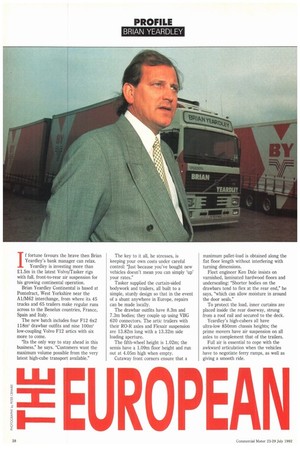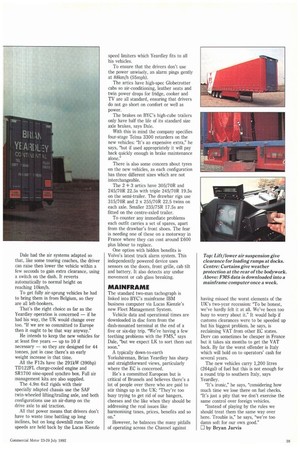1 f fortune favours the brave then Brian Yeardley's bank
Page 40

Page 41

If you've noticed an error in this article please click here to report it so we can fix it.
manager can relax. Yeardley is investing more than £1.5m in the latest Volvo/Tasker rigs with full, front-to-rear air suspension for his growing continental operation.
Brian Yeardley Continental is based at Pontefract, West Yorkshire near the A1/M62 interchange, from where its 45 trucks and 65 trailers make regular runs across to the Benelux countries, France, Spain and Italy.
The new batch includes four F12 6x2 118m3 drawbar outfits and nine 10Orn' low-coupling Volvo F12 artics with six more to come.
Its the only way to stay ahead in this business," he says. "Customers want the maximum volume possible from the very latest high-cube transport available." The key to it all, he stresses, is keeping your own costs under careful control: "Just because you've bought new vehicles doesn't mean you can simply 'up' your rates."
Tasker supplied the curtain-sided bodywork and trailers, all built to a simple, sturdy design so that in the event of a shunt anywhere in Europe, repairs can be made locally.
The drawbar outfits have 8.3m and 7.3m bodies; they couple up using VBG 620 connectors. The artic trailers with their RO-R axles and Flexair suspension are 13.82m long with a 13.32m side loading aperture.
The fifth-wheel height is 1.02m; the semis have a 1.09m floor height and run out at 4.05m high when empty.
Cutaway front corners ensure that a
maximum pallet-load is obtained along the flat floor length without interfering with turning dimensions.
Fleet engineer Ken Dale insists on varnished, laminated hardwood floors and undersealing: "Shorter bodies on the drawbars tend to flex at the rear end," he says, "which can allow moisture in around the door seals."
To protect the load, inner curtains are placed inside the rear doorway, strung from a roof rail and secured to the deck.
Yeardley's high-cubers all have ultra-low 850mm chassis heights; the prime movers have air suspension on all axles to complement that of the trailers.
Full air is essential to cope with the awkward articulation when the vehicles have to negotiate ferry ramps, as well as giving a smooth ride. Dale had the air systems adapted so that, like some touring coaches, the driver can raise then lower the vehicle within a few seconds to gain extra clearance, using a switch on the dash. It reverts automatically to normal height on reaching 10Ion/h.
To get fully air-sprung vehicles he had to bring them in from Belgium, so they are all left-hookers.
That's the right choice as far as the Yeardley operation is concerned — if he had his way, the UK would change over too. "If we are so committed to Europe then it ought to be that way anyway."
He intends to keep the new vehicles for at least five years — up to 10 if necessary — so they are designed for 44 tonnes, just in case there's an early weight increase in that time.
All the F12s have the 291kW (390hp) TD122FL charge-cooled engine and SR1700 nine-speed synchro box. Full air management kits are also supplied.
The 4.9m 6x2 rigids with their specially adapted chassis use the SAF twin-wheeled lifting/trailing axle, and both configurations use an air-dump on the drive axle to aid traction.
All that power means that drivers don't have to waste time battling up long inclines, but on long downhill runs their speeds are held back by the Lucas Kienzle speed limiters which Yeardley fits to all his vehicles.
To ensure that the drivers don't use the power unwisely, an alarm pings gently at 88km/h (55mph).
The artics have high-spec Globetrotter cabs so air-conditioning, leather seats and twin power drops for fridge, cooker and TV are all standard, ensuring that drivers do not go short on comfort or well as power.
The brakes on BYC's high-cube trailers only have half the life of its standard size axle brakes, says Dale.
With this in mind the company specifies four-stage Telma 3300 retarders on the new vehicles: "It's an expensive extra," he says, "but if used appropriately it will pay back quickly enough in brake maintenance alone."
There is also some concern about tyres on the new vehicles, as each configuration has three different sizes which are not interchangeable.
The 2 + 3 attics have 305/70R and 245/70R 22.5s with triple 245/70R 19.5s on the semi-trailer. The drawbar rigs use 315/70R and 2 x 255/70R 22.5 twins on each axle. Smaller 235/75R 17.5s are fitted on the centre-axled trailer.
To counter any immediate problems each outfit carries a set of spares, apart from the drawbar's front shoes. The fear is needing one of these on a motorway in France where they can cost around £600 plus labour to replace.
One option with hidden benefits is Volvo's latest truck alarm system. This independently powered device uses sensors on the doors, front grille, cab tilt and battery. It also detects any undue movement or cab glass breaking.
The standard two-man tachograph is linked into BYC's mainframe IBM business computer via Lucas Kienzle's new Fleet Management System.
Vehicle data and operational times are downloaded in disc form from the dash-mounted terminal at the end of a five or six-day trip. "We're having a few teething problems with the FMS," says Dale, "but we expect LK to sort them out soon."
A typically down-to-earth Yorkshireman, Brian Yeardley has sharp and straightforward views, particularly where the EC is concerned.
He's a committed European but is critical of Brussels and believes there's a lot of people over there who are paid to stir things up in the UK: "They're too busy trying to get rid of our bangers, cheeses and the like when they should be addressing the real issues like harmonising taxes, prices, benefits and so on."
However, he balances the many pitfalls of operating across the Channel against having missed the worst elements of the UK's two-year recession: "To be honest, we've hardly felt it at all. We've been too busy to worry about it." It would help if customs clearances were to be speeded up but his biggest problem, he says, is reclaiming VAT from other EC states. Dery can sometimes be cheaper in France but it takes six months to get the VAT back. By far the worst offender is Italy which will hold on to operators' cash for several years.
The new vehicles carry 1,200 litres (264ga1) of fuel but this is not enough for a round trip to southern Italy, says Yeardley.
"It's ironic," he says, "considering how much time we lose there on fuel checks. "It's just a pity that we don't exercise the same control over foreign vehicles.
"Instead of playing by the rules we should treat them the same way over here. Trouble is," he says, "we're too damn soft for our own good."
0 by Bryan Jarvis
















































































